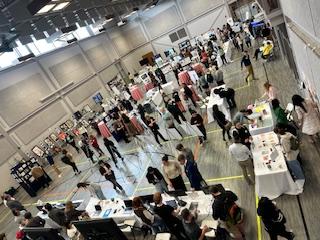
In collaboration with the Community College System of New Hampshire and the New Hampshire Humanities Collaborative (NHHC), GRSIL facilitates curricular innovation in spring semester courses through the Spring Symposium series. Select faculty projects centered around a theme or prompt are grant funded and incorporated into spring courses. Students and faculty gather to share their work at a symposium.
Spring 2025
“Sustaining Community and Communities”
April 11, 2025
1:00-3:00 pm
Huddleston Hall (UNH Durham)
How can we sustain our community and communities? Communities provide a foundation for civic participation, social engagement, a sense of belonging, the preservation and celebration of culture and build resilience. Strong communities can counter marginalization and foster shared understandings. Overall, communities can improve the quality of life for both individuals and society. There are calls for sustaining communities through public spaces, inclusive programs, urban planning, housing, development, public transportation, and natural resource use.
Sponsored by the University of New Hampshire College of Liberal Arts, the Global Racial and Social Inequality Lab, the New Hampshire Humanities Collaborative and the Community College System of New Hampshire, the spring 2025 symposium, “Sustaining Community and Communities,” is designed to encourage dialogue and exploration of issues related to community and communities.

Past Research Symposiums
“Memory and Memorials” Spring 2024 Symposium
April 19, 2024. Manchester Community College.
What roles do memory and memorialization play in the construction of the human experience? How do they reflect and influence racial and social inequality? The New Hampshire Humanities Collaborative (NHHC) and the UNH College of Liberal Arts and its Global Racial and Social Inequality Lab (GRSIL) offered small grants for the creation of program content for the Collaborative’s Spring Symposium entitled “Memory and Memorials." The event was designed to encourage broad dialogue and exploration of issues related to memory and memorialization through projects integrated into spring semester courses. View the program linked below to learn more about spring 2024 projects.
Memory and Memorials Symposium Program



“Live Free…” Symposium Spring 2023
April 7, 2023. New Hampshire Technical Institute.
What does it mean to be free? Why is freedom such a coveted value? What role do conceptions of freedom play in racial and social justice? How do we understand freedom and what does this mean for the humanities and social justice? For centuries humans have proclaimed the value of freedom. Vivre libre ou mourir (“Live Free or Die”) was a popular motto of the French Revolution. A similar sentiment was proclaimed by Patrick Henry during the American Revolutionary War and echoed in 1809 when General John Stark proclaimed “Live free or die…” inspiring the New Hampshire state motto. The event encourages dialogue and exploration of the idea and manifestations of freedom. To enhance the engagement by UNH and community college students, GRSIL funded faculty proposals that integrated this theme/topic into course curriculum during the semester. View the program linked below to learn more about spring 2023 projects.
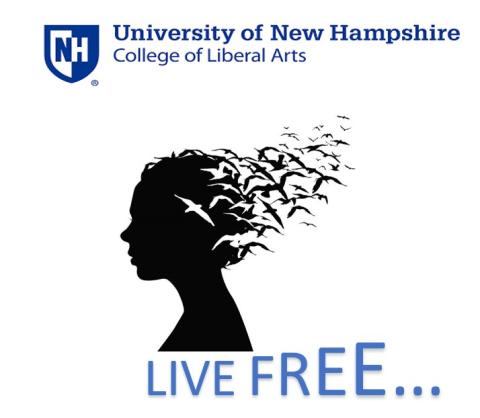
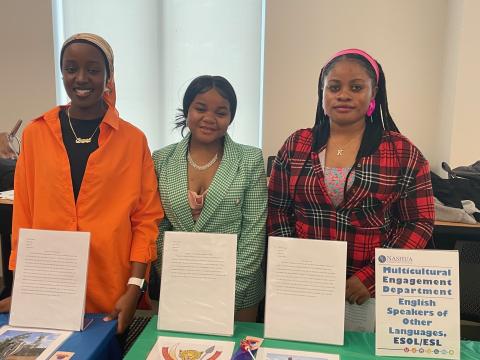

We Hold These Truths... Spring 2022 Symposium
April 8, 2022. New Hampshire Technical Institute.
What role do conceptions of truth play in racial and social inequality? The New Hampshire Humanities Collaborative (NHHC), the UNH College of Liberal Arts, and its Global Racial and Social Inequality Lab (GRSIL) offered small grants to support the creation of program content for the Collaborative’s “We Hold These Truths…” event in April 2022. The event promoted the exploration of the essential commitment expressed in the Declaration of Independence: “We hold these truths to be self-evident, that all men are created equal, that they are endowed by their Creator with certain unalienable Rights, that among these are Life, Liberty, and the pursuit of Happiness.”
We Hold These Truths... Symposium Program

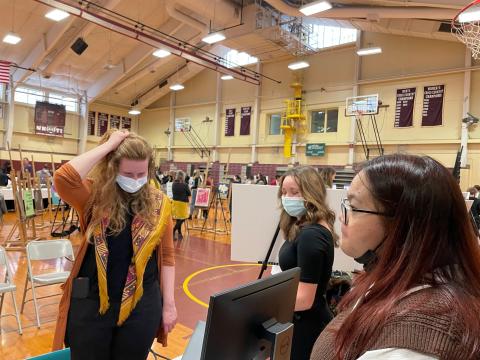
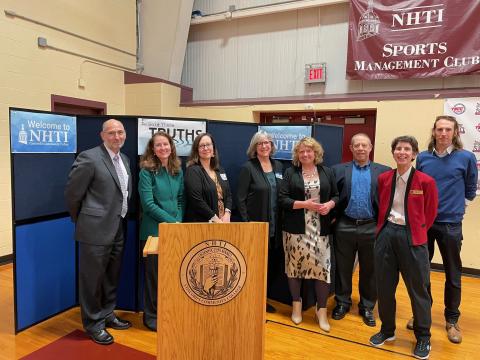
Spring 2024 Call for Proposals
Awards include a $1000 stipend (per faculty/staff) and a budget ranging between $500 and $2,000 based on project needs. If faculty/staff from both UNH and a community college are partnering the budget limit is $4,000.
We encourage proposals that support both formal and informal engagement with issues related to memory, memorials and how they are construed as well as scientific, social and artistic representations of these themes (i.e., scholarship, scientific methodologies, philosophical, anthropological, literary, political, legal, global, and religious perspectives etc.).
Proposal outputs can take the form of curriculum units, student presentations, co-creations between students and/or faculty, collaborative research between students and/or faculty, the design and publishing of websites and other digital media, and events and other community outreach projects. We encourage artistic expression, written works, and visual and performance-based projects. A pop-up gallery space will house arts-based projects.
Examples of approaches in different disciplines:
- Art and Literature: How is memory depicted, contested, and explored through visual and written mediums?
- History and Classics: How have ideas around memory and memorials been treated historically, and how do they influence our understanding today?
- Race and Gender: What is the relationship between memory, memorials and questions of diversity, equality, and inclusion?
- Architecture and Design: How do we understand and envision memory and memorials in “place and space”?
- Disability Justice: What is the relationship between accessibility and the questions of memory and memorials?
- Language and Culture: How do different cultures (present and historical) create and interpret conceptions of memory and memorials?
- Music and Performance Art: How do we explore, portray, interpret, and reveal what we remember, both individually and collectively?
- Computer Science and Technology: How does human engagement with technology influence understanding of memory and memorials?
- Mathematics and Science: How do the disciplines of math and science establish, test, and support claims about memory and memorials?
- Social Sciences: How do conceptions of memory and memorialization frame justice and legal systems? How have narratives regarding "memory” or the construction of memorials been used as a tool of oppression and marginalization, or instruments of liberation and equality?
Other forms of participation:
- Music/dance performances, art compositions, demonstrations etc.., are also encouraged.
- Individual students with relevant projects are welcome to apply independent of specific academic courses.
- We also seek a graphic and digital arts class and/or students to partner in the creation of a logo, pamphlet or poster for the event’s promotion.
The GRSIL and NHHC collaborative encourage projects that foster partnerships between students and faculty/staff from UNH and the community colleges, or with other New Hampshire institutions. Participants are thus encouraged to participate in the virtual Winter Academy January 14, 2024 to further explore inter and intra campus collaborations. While we encourage collaboration across classes and institutions, we also encourage projects that do not have a collaborative component, so long as the key themes of the call are engaged.
Evaluation Criteria:
- Rigorous and robust engagement with themes of memory and memorials and collective understanding
- Supports the GRSIL and NHHC mission (see https://cola.unh.edu/global-racial-social-inequality-lab)
- Feasibility of the budget and innovation
- Potential impact of the project (including, if appropriate, the number of students served and timeframe)
- Level of cross-campus engagement and collaboration
Application Process: please submit the following documents:
Proposal requirements
- 1-2 page program description including abstract, curricular plans, potential collaborations, and student deliverables for presentation at the April event.
- Itemized budget and budget narrative/rationale
Proposals due: December 8, 2023 (email to Paul.Robertson@unh.edu or Alynna.Lyon@unh.edu). Decisions made mid-December.
If you have questions, please contact Alynna Lyon (Alynna.lyon@unh.edu), Leslie Barber (lbarber@ccsnh.edu), or Stephanie Roper (sroper@ccsnh.edu).
